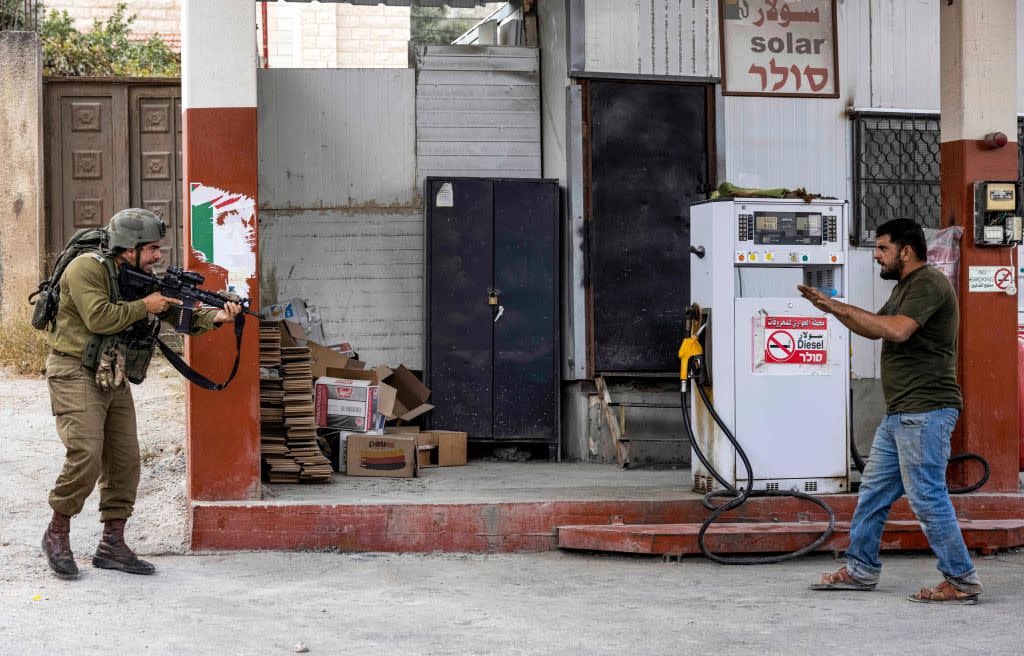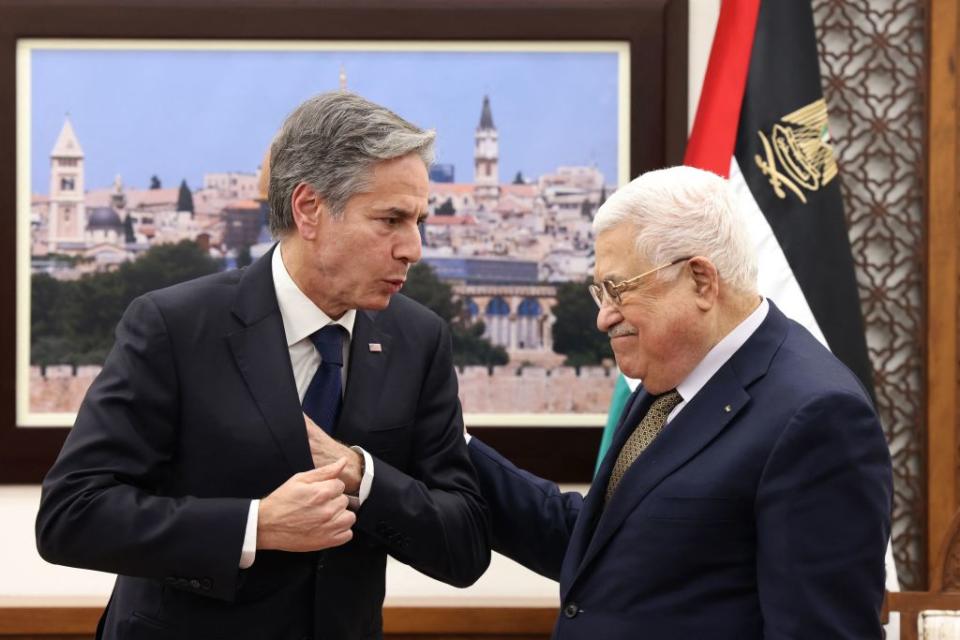Settler Attacks in the West Bank Are On the Rise. Israel’s New Leaders May Make it Worse

An Israeli soldier aims his rifle at a Palestinian man during clashes in which Israeli settlers attacked Palestinian residents and shops in the town of Huwara in the occupied West Bank on October 13, 2022. Credit - Oren Ziv—AFP/Getty Images
Bashar Eid — a tall, stocky 49-year-old farmer — was shot, beaten, stoned, his bones broken and his olive trees burned by his neighbors, the Jewish settlers who live on the top of the hill above the Palestinian man’s land in Burin, a village in the West Bank.
This type of abuse has been a persistent reality for 20 years, but in 2022 it became news across the Green Line in Israel. Some 50 Jewish Israelis were so outraged by what he suffered that on a Friday morning last January they came to help him replace the olive trees. But after the last saplings were planted, about 20 young settlers armed with rocks, clubs and gasoline, masking their faces with torn T-shirts, charged down the hill like soldiers on an ancient battlefield. They beat and stoned the Israeli volunteers, including men and women in their 70s and 80s, as well as, once again, Eid. Then they set a Jewish volunteer’s car on fire. It was all caught on film.
Doron Meinrat, 63, a retired Israeli colonel whose arm was broken and head was gashed, said that at no point did he see an Israeli soldier or policeman, the forces charged with maintaining order on the Palestinian land that Israel has militarily occupied for 54 years. “That,” Meinrat says, “illustrated how much life in this area is a no-man’s land for the Palestinian residents living on their land.”
Read More: The Once ‘Unbreakable’ U.S.-Israel Bond Is Under Strain
And all this was before Prime Minister Benjamin Netanyahu took office again in December at the helm of the most right-wing religious government since the founding of the state.
Netanyahu named Itamar Ben-Gvir as Minister of National Security and agreed to push through a law to transfer certain authority and powers of the police chief over the border police’s West Bank division to Ben-Gvir, a disciple of the infamous Meir Kahane, among the most notorious right-wing Arab-hating extremists in Israel’s history, whom the nation’s chief of police named as the biggest inciter of violence in the May 2021 Jewish-Arab riots. Netanyahu also gave another right-wing extremist, Bezalel Smotrich, powers in the Defense Ministry and control over the Civil Administration and the Coordinator of Government activities in the West Bank. It is a bland title with immense power: the office decides who gets to build, and whose buildings are demolished.
On Jan. 17, U.S. National Security Advisor Jake Sullivan arrived in Israel to talk policy with Netanyahu and his ministers. And this week, U.S. Secretary of State Anthony J. Blinken met with Palestinian President Mahmoud Abbas; his chief goal in Ramallah appeared to be persuading Palestinian leadership to help reduce tensions in the West Bank. In their meeting, Blinken promised Mr. Abbas the Biden administration opposes settler violence, settlement expansion and the legalization of outposts.

For years, Jewish settlers living atop hills across the West Bank have mounted attacks on the Palestinians, like Eid, living below. Israeli soldiers—required under the international law of occupation to protect the local populace—normally come to the side of the settlers, shooting tear gas grenades, rubber bullets and live rounds to disperse Palestinians off their own lands—and sometimes even join the settlers in the attacks.
Numbers tell part of the story: Israeli forces injured 2,081 Palestinians in settler-related incidents in 2022; four times more than in 2021. In 2022 there was a 48% increase in the number of incidents of settler violence compared to 2021. Just last weekend, in the northern part of the West Bank, Israeli settlers carried out approximately 144 attacks against Palestinians and their properties, according to Ghassan Daghlas, a Palestinian official in charge of settlement activity in that area, and the Israeli military.
“22 cars were set on fire, a house was arsoned, and there were attempts to set other homes on fire,” said Daghlas. “Settlers attacked Red Crescent ambulances and threw stones at more than 220 cars during three days. The situation is very serious and very dangerous.” Eid was again among those attacked; settlers came down the hill and threw rocks at his home.
On the West Bank, surges in settler violence coincided with the presidency of Donald Trump, who abandoned the historical pretense of Washington supporting Palestinian aspirations to statehood and unabashedly favored Israel. To that end, Trump’s administration almost completely refrained from criticizing Israel’s West Bank policies, which violate the rules of war barring settlement on conquered land. In fact, under Trump, the Israeli government more than doubled the number of housing unit plans promoted in the settlements that already exist, many of which resemble suburban subdivisions. But settlements typically begin modestly, as trailers or simple structures known as “outposts,” which Israeli governments call illegal but protect as a vanguard. According to the left-wing Israeli group Peace Now, at least 47 new outposts were established during the Trump administration, compared to 11 in the previous four years. Meanwhile, the zealous young people who typically inhabit the outposts—long regarded in Israel proper as extremists—were rebranded as “young pioneers.”
A dozen of them—men, teens and boys wearing hoodies with their tzitzit strings hanging down the sides of their pants—stood on the edge of Eid’s land on a cloudy day two weeks after the beating of the elderly Jewish helpers. They stared down at some 400 Jewish volunteers who had walked in twos, carrying bags of saplings and shovels up the stone-terraced hill. But before the volunteers could reach the top of Eid’s land they were blocked by Israeli soldiers and police clad in riot gear and carrying M-16s and cameras.
“Why?” asked Gaby Lasky, who at the time was a Knesset member from the left-wing Meretz party, which still had seats in the legislature. “This is privately-owned land. Why can’t they plant here?” The major in charge pulled out a document with a Google map printed on it. A red circle designated Eid’s fields as a “closed military zone.”
“You are prohibited from being here,” the major said. Then he turned away.

Israel’s liberal left is now looking to the Biden administration to rescue the country from its worrying trajectory. Before these elections, in a reversion to decades of American policy, the Biden administration warned Israel of the diplomatic implications of a state plan to legalize an outpost known as Evyatar. In the first nine months since settlers set up trailers there, the Israeli army killed seven Palestinian protesters, all from the village of Beita, on whose land it is built. However, as part of the coalition negotiations, Netanyahu agreed to build a yeshiva in Evyatar.
In December 2021, the State Department published the new administration’s first Country Reports on Terrorism, with a section on settler and military Israeli violence that was far more detailed than it was during the Trump years. A senior Israeli official told The Jerusalem Post that the U.S. government is “obsessed with settler violence.” The Biden administration also demanded a “clarification” into the death of Omar Abdalmajeed As’ad, a Palestinian-American dual citizen who was confronted late at night on January 12 by Israeli soldiers from a battalion that includes many settlers. The 78-year-old was pulled from his car, handcuffed, gagged, blindfolded and left on the ground at a construction site in the freezing cold, where he died of a heart attack, which according to a post-mortem was caused by his treatment. The Israeli newspaper Haaretz quoted an unnamed military official as saying the soldiers “did not see him as a human being.” Israel opened an investigation at the behest of the U.S. government.
Now Ben-Gvir aims to ease the open-fire regulations so police can shoot anyone representing a “potential threat” and to give all border police and soldiers immunity for potential criminal acts during military operations, creating an even greater sense of impunity. As the new government was being formed, it appeared to observers it was already having an effect on Israeli soldiers’ excessive use of lethal force.
Read More: The Israeli-Palestinian Conflict Is Also a Looming Climate Disaster
This past December, a chilling video exposed the execution of a young Palestinian man by an Israeli border police officer in the West Bank town of Huwarra. Ben-Gvir called the soldier “a hero,” and then-Prime Minister Yair Lapid and then-Defense Minister Benny Gantz also backed the officer. The U.N. Special Coordinator for the Middle East Peace Process tweeted that he was “horrified” by the killing and the European Union expressed its “grave concern about the increasing level of violence in the occupied West Bank, including East Jerusalem,” noting that “in the last 72 hours alone, ten Palestinians were killed by ISF in what appears to be an excessive use of lethal force.” Israel opened no investigation.
Yesh Din is an Israeli legal advocacy organization that helps Palestinians confront the policies in Israeli courts. But, says executive director Lior Amihai, “when settlers attack a Palestinian home at night, the Palestinians can’t call someone to come help them. They are completely alone. It’s the Wild West. That’s why it’s like a pogrom.”
The U.S. is not happy with the composition of the new Israeli government. A bilateral delegation of U.S. senators asked not to meet with either Ben-Gvir or Smotrich during their visit to Israel mid-January. The request was made by the office of Democratic Senator Jacky Rosen, one of the party’s most pro-Israel members.
In a thinly-veiled message after the results of the November elections, State Department spokesman Ned Price said that the U.S. “hope[s] that all Israeli government officials will continue to share the values of an open, democratic society including tolerance and respect for all in civil society, particularly for minority groups.”
Fearing what would happen with extremists in key security posts, the U.S. later reportedly expressed its opposition to Smotrich becoming the defense minister, as he had demanded. And in December, a U.S senator said the administration was working to limit Ben-Gvir’s and Smotrich’s influence in the next government. Israel’s generals are alarmed, too. A former police chief called Ben-Gvir a “tremendous danger.” Former defense minister Benny Gantz warned that Ben-Gvir will turn the border police into a private militia in the West Bank and “it may cost human lives.” Former defense minister Gadi Eisenkot has called for a million-strong rally if that happens.
In the meantime, Eid has gone to the hospital twice in the last few months after being attacked by settlers coming from Givat Ronen. His car was set on fire and he and his family fear for their lives—even more so since the new government was formed. He is asking for help from liberal Jewish Israelis to finance a high cement wall he is building around his land.
“Not Blinken’s visit or anyone else’s is going to improve the situation … there are going to be more problems,” Eid says. “The settlers attack me; no one helps me.”


